Samsung SSD 840 Pro (256GB) Review
by Anand Lal Shimpi on September 24, 2012 7:00 AM EST- Posted in
- Storage
- SSDs
- Samsung
- Samsung SSD 840
Random Read/Write Speed
The four corners of SSD performance are as follows: random read, random write, sequential read and sequential write speed. Random accesses are generally small in size, while sequential accesses tend to be larger and thus we have the four Iometer tests we use in all of our reviews.
Our first test writes 4KB in a completely random pattern over an 8GB space of the drive to simulate the sort of random access that you'd see on an OS drive (even this is more stressful than a normal desktop user would see). I perform three concurrent IOs and run the test for 3 minutes. The results reported are in average MB/s over the entire time. We use both standard pseudo randomly generated data for each write as well as fully random data to show you both the maximum and minimum performance offered by SandForce based drives in these tests. The average performance of SF drives will likely be somewhere in between the two values for each drive you see in the graphs. For an understanding of why this matters, read our original SandForce article.
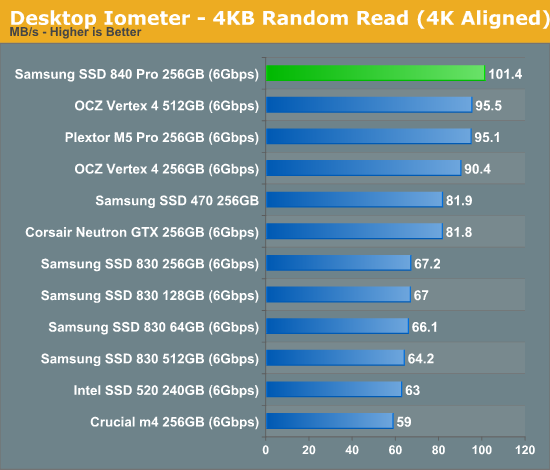
We have a new king, the 840 Pro manages to inch past the fastest Vertex 4 in our random read performance test.
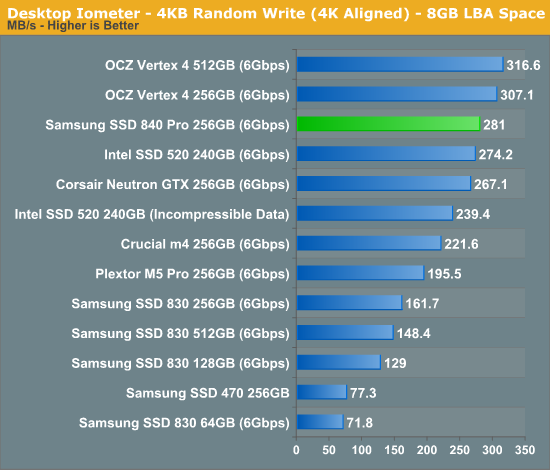
The low queue depth random write performance crown goes back to the Vertex 4, but the 840 Pro is around 75% faster than the old 830. Other than the Vertex 4, there's nothing faster than the 840 Pro here.
Many of you have asked for random write performance at higher queue depths. What I have below is our 4KB random write test performed at a queue depth of 32 instead of 3. While the vast majority of desktop usage models experience queue depths of 0 - 5, higher depths are possible in heavy I/O (and multi-user) workloads:
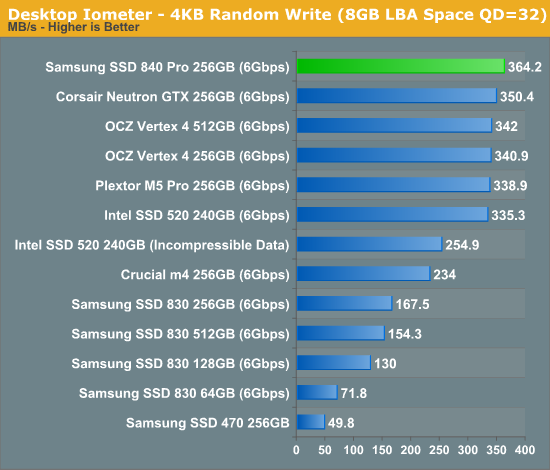
Ramp up queue depth and the 840 Pro manages to even outperform Corsair's new Neutron GTX.
Sequential Read/Write Speed
To measure sequential performance I ran a 1 minute long 128KB sequential test over the entire span of the drive at a queue depth of 1. The results reported are in average MB/s over the entire test length.
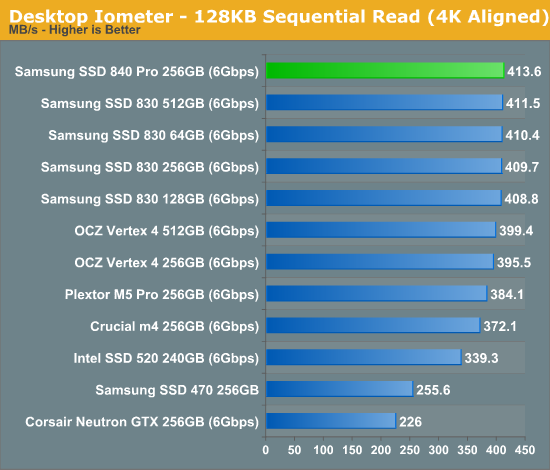
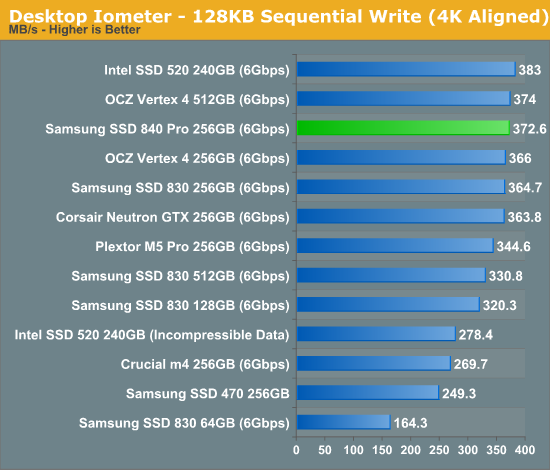
There are no tradeoffs here: excellent random IO performance and class leading low queue depth sequential performance. The 840 Pro is looking like a good all-around performer.
AS-SSD Incompressible Sequential Performance
The AS-SSD sequential benchmark uses incompressible data for all of its transfers. The result is a pretty big reduction in sequential write speed on SandForce based controllers.
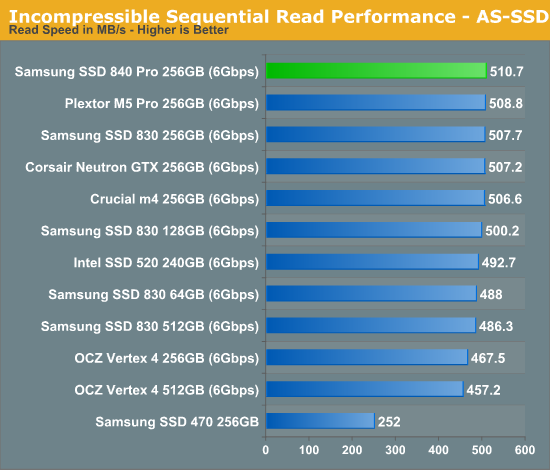
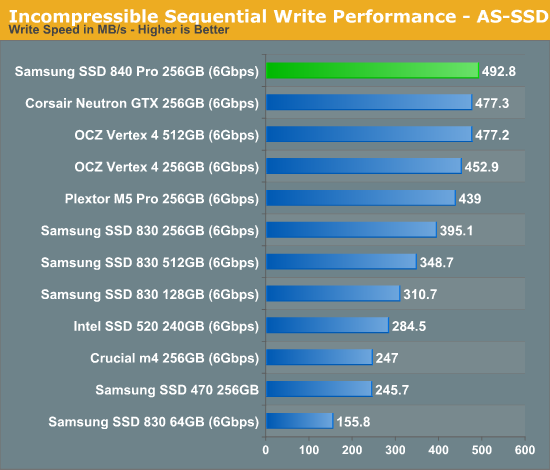
The 840 Pro lands on top once again in these higher queue depth sequential tests. The competition is hot on the heels of the 840 Pro however, we're limited by 6Gbps SATA here so expect continued clustering around 500MB/s going forward.










96 Comments
View All Comments
nextel2010 - Tuesday, September 25, 2012 - link
I couldn't agree more. I have two Samsung 830's, and they have been bulletproof. I used them to replace two Intel 520's, one of which was BSODing several times a day, and the other intermittently, both on previously stable systems. The SF-2281 controllers on those still need work, in spite of Intel's best efforts to date. The 830's have reliable, proven controllers. In practice, they are as wicked fast as the 520's. I never regretted switching over from Intel. While the 840's are likely to take the performance crown, to me, the 830 is fast enough, and new controllers make me nervous. Give me a year of proven stability, and I'll consider switching (of course, the 850 will be out by then...).FunBunny2 - Tuesday, September 25, 2012 - link
The only problem with waiting a year: with Moore still in control (mostly, really, integration) controllers go out of style in a year. I wonder how long any stable manufacturers (let alone the likes of OCZ) will still have a controller 3 or 5 years out?IOW, just as we don't really need the "improved" iPhoneX every so often, the same is true in the SSD space. It's planned obsolescence.
Old_Fogie_Late_Bloomer - Tuesday, September 25, 2012 - link
After moving my Steam folder from my SATA II Intel 320 160Gb to my SATA III Samsung 830 64GB and seeing basically no difference in load times, I have to say that I'll probably keep my eyes peeled for deals on the 830, rather than jumping on the 840. If I could get a 512GB for my laptop for under $400, I'd jump on it and not worry about the difference in performance.HisDivineOrder - Wednesday, September 26, 2012 - link
Agree on the massive discount, but... so far I haven't seen a "massive discount." The 256gig drive I've been eyeing has been hovering around the $200 price point for a long time now. That's not massive to me. Newegg priced it once for $180 and that was pretty decent for a "massive" discount, but they only did that twice and haven't done it in a long while (ie., since I had the cash to invest).This is especially relevant when I expect the 840 Pro to drop around that point ($200-ish) once supply matches demand within a couple of months. I'm not interested in beta testing TLC for Samsung either.
And I'd probably pay an extra $20 ($220) to have the superior performance/perf per watt of the 840 when push comes to shove.
dananski - Monday, September 24, 2012 - link
Very impressive indeed. Quite a decent improvement on their main performance competitor - their own 830. Don't think it'll be necessary to upgrade from said 830 in my desktop, since that is lovely and fast already, though with the far lower power consumption this could be an ideal laptop upgrade for pretty much anyone :)Eeqmcsq - Monday, September 24, 2012 - link
Mmm... bumping up against that SATA 6 Gbps wall. I can't wait for SATA Express to bust through this wall. I know the faster interface won't make much difference for typical real-world use cases, but SSD performance has increased so quickly over the past few years, I don't want to see its progress slowed by an interface bottleneck.iwod - Monday, September 24, 2012 - link
Yes we really need those quick. And hopefully straight to PCI-E 3.0 as well so it would provide us a true Bi-Directional 2GB/sI think we will hit diminishing of returns once we hit that high numbers with the current software.
nathanddrews - Monday, September 24, 2012 - link
While a 2GB/sec sequential access would be awesome - no disagreement there - it won't feel like much of an upgrade without a significant gain in random IO. A drive that hits the 6Gbps peak in random 4K access would impress me more.Grok42 - Monday, September 24, 2012 - link
Whatever the next interconnect is, I hope they build it for the next 10 years. I'm tired of all these incremental improvements requiring different cables. Maybe I've just been building computers too long?Denithor - Tuesday, September 25, 2012 - link
SATA Express isn't going to require a different cable. Go read the article for more details.